Have you ever been drifting off to sleep when you hear your cat meowing or howling from the hallway? This can disturb your sleep and even make you worry about your furbaby. So, let’s discuss the reasons cats meow at night and how we can quiet them down.
Firstly, it’s important to know that cats are crepuscular. This means they’re naturally most active at dusk and dawn, which is when you’re most likely to hear them meowing.
The most common reason cats meow at night is that this is when they feel most active. Cats may become bored, lonely, or playful during the night. This is also a common time to hear cats mate or fight. Some cats meow at night when they’re sick or in pain.
In this article, we’ll discuss 18 reasons cats meow at night and how to keep them quiet so that you can get a good night’s sleep.
Reasons Cats Meow At Night
#1 Boredom
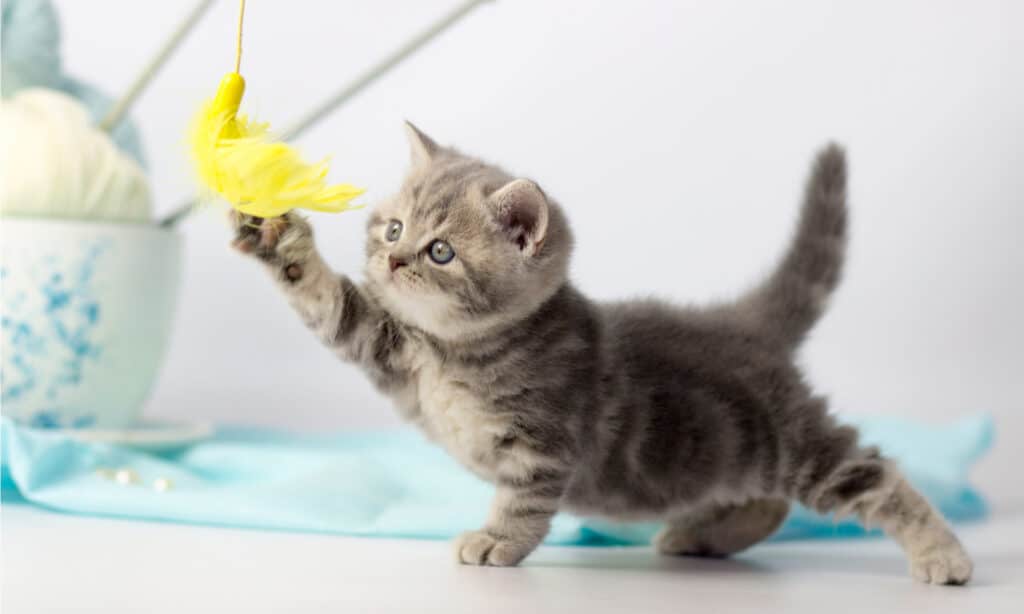
Many cats don’t receive the daily play they need to prevent boredom.
©Katrin Baidimirova/Shutterstock.com
A common reason cats meow at night is because they’re bored. Many housecats don’t get enough physical or mental stimulation throughout the day. As a result, they’re using that build-up of energy to meow, bounce off the walls of the hallway, and keep you up at night.
Of course, cats who get playtime during the day can also become bored when they’re wide awake and their humans are sleeping. Tiring them out directly before bed can help with this, as can ensuring they have another cat in the house as a playmate.
#2 Loneliness

Cats often meow when they’re lonely.
©iStock.com/Svetlana Popova
Loneliness, or even separation anxiety, can cause cats to cry out at night. Some kitties will quiet down if allowed to be near their favorite person or even another animal.
#3 Lack of Exercise

Cats can get noisy at night if they don’t get enough exercise throughout the day.
©Nils Jacobi/Shutterstock.com
Lack of exercise during the day can cause boredom, but it can also cause your cat to get all their zoomies out at night time.
Playing with your cat every day, especially right before bed, can set them up with a better routine and stop them from racing around meowing at night.
#4 They Want Outside

Cats should be kept indoors unless enclosed or leashed, but newly indoor cats may meow at night if they want out.
©iStock.com/Oksana Lyskova
Indoor-outdoor cats (or former ones) are notorious for meowing at the door until they’re let outside, even in the middle of the night. In a case like this, I strongly recommend waiting out their cries and keeping them indoors permanently.
Outdoor cats act as an invasive species and are a threat to native wildlife. It’s also not safe for cats themselves to be outdoors unsupervised, no matter where you live. Indoor cats live longer, healthier lives.
If you’re transitioning a cat from outdoor to indoor, be sure to give them plenty of playtime to replace the exercise and mental enrichment they were getting outdoors. Otherwise, indoors can feel like a boring place for them!
#5 They Want Food

Meowing at night can indicate that your cat is hungry or thinks it needs more food!
©iStock.com/kozorog
Is your kitty on a new diet? They might be meowing at night because they want more food. Or, maybe you forgot dinner tonight!
When I switched my cats away from free-feeding, nighttime in our house was noisy for a while. Usually, the meowing quiets once your cat realizes you won’t get up to feed them more.
Not having a mealtime routine can also confuse a cat and make them beg for food at inappropriate times. It’s best to feed them at the same time every day so that they know when to expect it.
#6 They’re Playing

Cats can get noisy while playing at night.
©iStock.com/Svetlana Popova
Your cat might meow with a toy in their mouth or at a toy they’re about to pounce on! Or, maybe your cats are noisily playing together.
#7 Feline Dementia

Cats with dementia can meow out of distress or confusion.
©Katniss studio/Shutterstock.com
Feline dementia can make cats feel confused, and they might not know where they are, where you are, or how to get where they need to be.
Anxiously crying out is a very common symptom of dementia in cats. If you haven’t received a diagnosis, it’s worth watching for other symptoms and bringing it up to your veterinarian.
#8 Hyperthyroidism

Hyperthyroidism and other illnesses can cause a cat to meow at night.
©Pressmaster/Shutterstock.com
Many health conditions can cause a cat to meow at night, including hyperthyroidism. Other symptoms of hyperthyroidism in cats include hyperactivity, weight loss, and increased appetite, thirst, and urination.
Treating your cat’s hyperthyroidism may stop or reduce the meowing.
#9 Kidney Disease

Cats with kidney disease are also more prone to nighttime meowing.
©Creative Cat Studio/Shutterstock.com
Kidney disease can also cause cats to cry at night. Other symptoms to watch for include increased thirst and urination, peeing outside of the litterbox, weight loss, tiredness, and high blood pressure.
Kidney disease cannot be cured, but it can be treated. These treatments can slow its progression and help ease the symptoms putting your cat in distress. Your cat may stop meowing at night once they’re not feeling as sick.
#10 Pain

Your cat might be meowing due to pain.
©iStock.com/Nils Jacobi
Pain, either from illness or injury, can make a cat meow at night. If you’ve noticed any other recent changes in behavior, appetite, thirst, or urination, note these as well and discuss them with your vet.
Cats hide pain very well. By the time we see even subtle signs of it in our furbabies, they’re likely in a great deal of pain.
#11 Mating
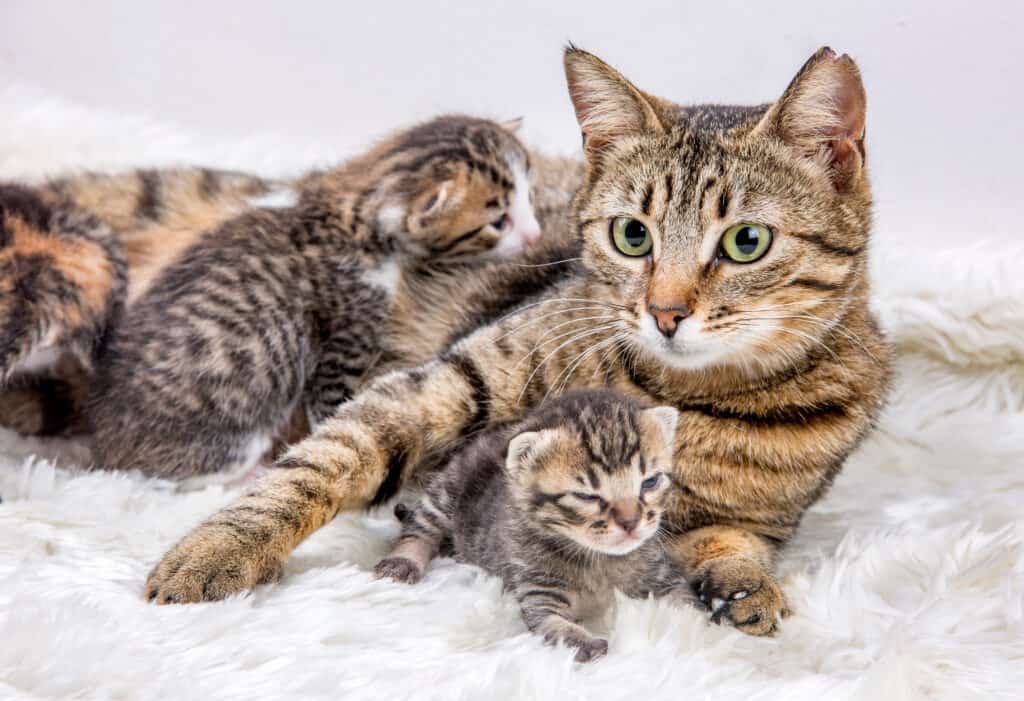
Cats make loud yowling sounds while mating.
©Esin Deniz/Shutterstock.com
If two cats are mating, either in your house or outside of it, you’ll hear them yowling at night. The best way to combat this, of course, is to ensure your cats are all spayed or neutered.
If stray cats outside are the problem, consider contacting a rescue that does TNR (trap, neuter, return) work or even bringing them to a free or low-cost clinic yourself!
#12 She’s In Heat
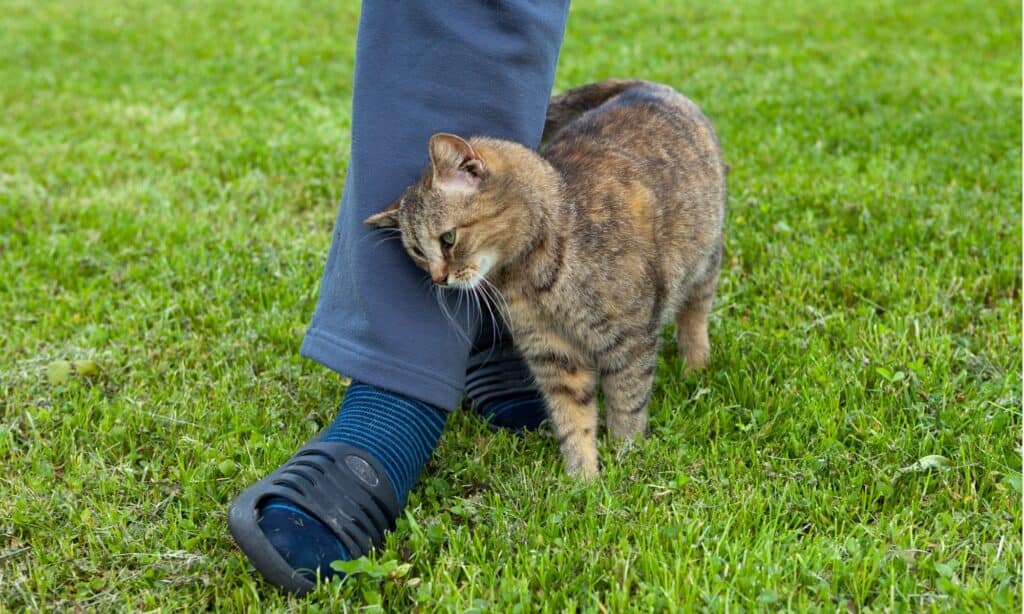
Female cats in heat can get quite loud at night as they’re looking for a mate.
©iStock.com/gsermek
A cat in heat will be very noisy! She might keep you up at night calling for a mate. This can happen at any time of day, but dusk and dawn are common since this is when cats are most active.
Once your cat is spayed, she will stop this behavior. She’ll also be on track to live a longer, healthier life!
#13 Fighting

True catfights are incredibly loud and may include meowing or screeching.
©Mariya Ilmaz/Shutterstock.com
Fighting cats will yowl and screech loudly! Since strays are most likely to be roaming at night, this is when you’ll hear them.
You might also have fights happen between your own cats. If it’s progressed to a place where the cats are screaming at one another, you’ll need to separate and slowly reintroduce them in order to have a peaceful home–and peaceful sleep!
#14 “Talking” to Outdoor Cats
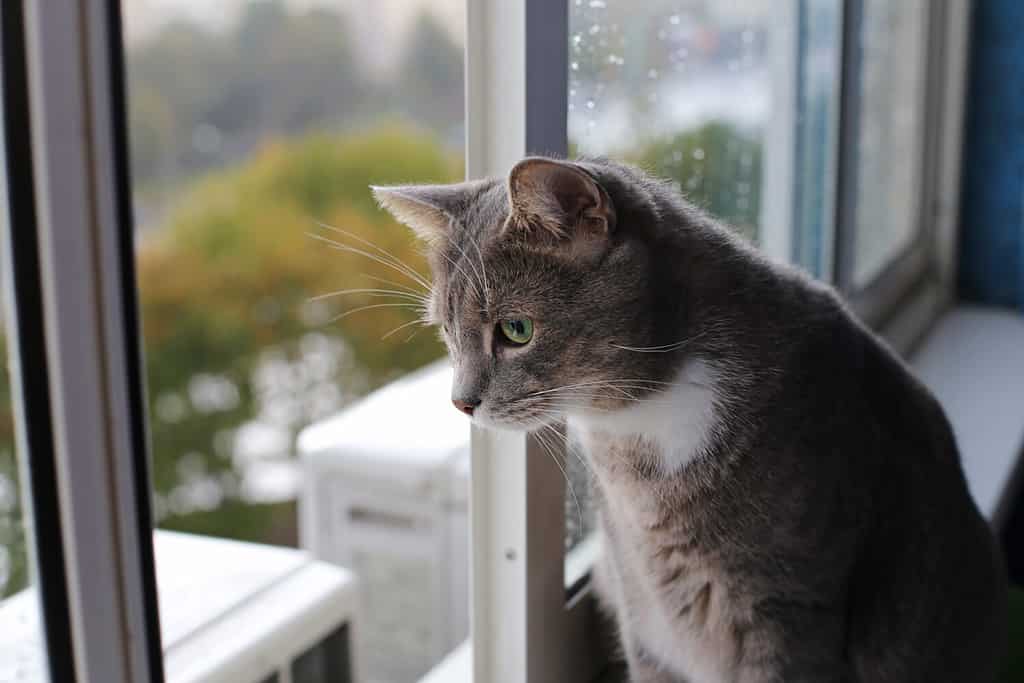
Outdoor cats are more likely to linger near your house at night, potentially scaring your cat.
©MorphoBio/Shutterstock.com
Your indoor cat may meow in interest or fear of other cats outside. Especially if outdoor cats wander up close to your house or sit on the windowsill, this can be very stressful to your cat.
Keeping them in another room where they can’t see the cat, closing the blinds, and playing white noise can all help.
#15 Dreaming
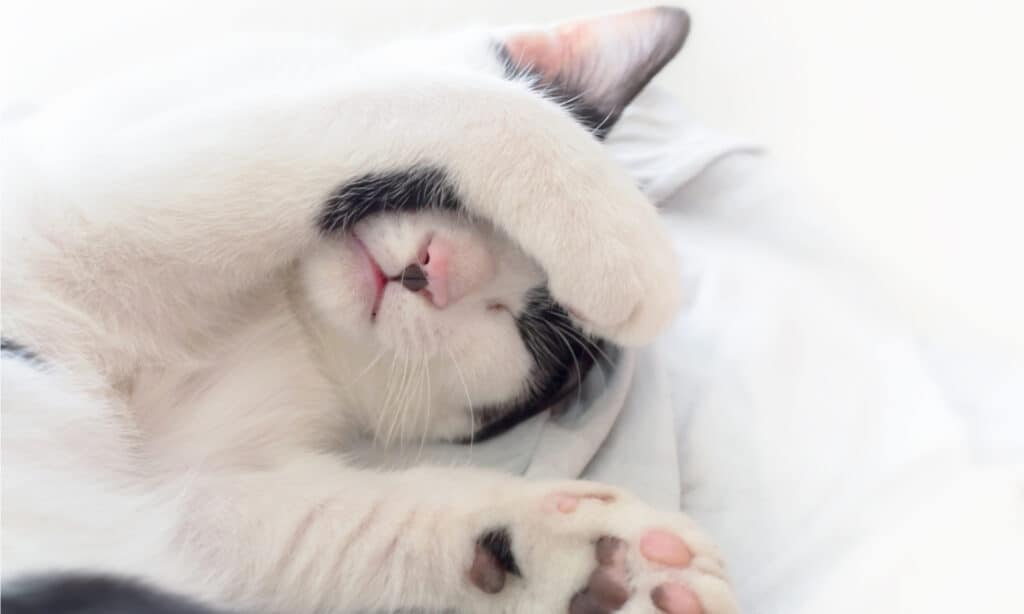
Dreams can cause cats to meow in their sleep.
©Gumpanat/Shutterstock.com
If your cat meows at night while they’re asleep next to you, they’re dreaming! You might also notice their legs kick or their face twitch.
#16 The Litterbox Isn’t Clean

Cats may meow as a way of telling you that the litterbox is too dirty for them.
©Natasha Zakharova/Shutterstock.com
Some cats are extra picky and don’t feel they can use a dirty litterbox. This could mean anything from the box actually being dirty to it containing a single clump of pee.
Scooping the litterboxes before bed can help, as can ensuring you have the right number of litterboxes in your home.
The general rule is one litterbox per cat plus one. So, even one cat should have two boxes!
#17 Fear

Your cat may be afraid of something outside, such as fireworks or the neighbors walking down the sidewalk. Or, they might fear something inside, such as another pet.
This can cause them to meow in distress. And it can sometimes be difficult to pinpoint since their eyes are so much better than ours in the dark! They might even hear things you can’t.
Drawing the blinds, playing white noise, and bringing your cat to the quietest room in the house can help to calm them down.
#18 They Want in the Bedroom
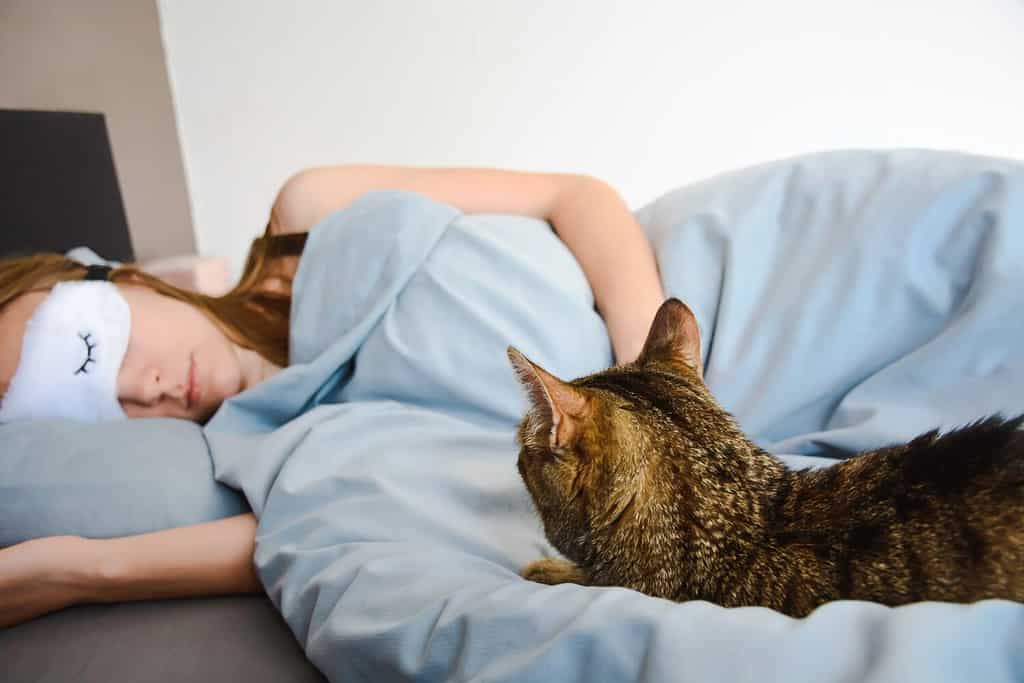
If your cat is locked out of the bedroom, it may meow to be let in.
©Ellyy/Shutterstock.com
Most cats dislike closed doors, especially when their favorite people are on the other side of them! If your bedroom door is closed, your cat might meow and scratch, trying to get inside.
Of course, the simplest option here is to open the door. Other solutions include setting up a comfy sleeping space for them outside of the room, blocking the door to prevent their scratching, and waiting them out until they get used to the new bedtime routine.
Should I Ignore My Cat Meowing at Night?
There are very few times you should ignore your cat meowing at night. If you know for certain why they’re meowing, and it’s in their best interest, you might have to ignore it and wait them out.
Examples include a change in diet or keeping your cat indoors even though it wants outside.
You may also choose to ignore them if you know they’re playing and having fun and the sound doesn’t bother you too much.
If you don’t know why your cat is meowing, especially if it’s a new behavior, your first step is to figure out why. This should include bringing them to the veterinarian to rule out any medical reasons.
Remember that cats meow to communicate with us, so we don’t want to automatically ignore that communication. They could be trying to tell you something important!
How to Keep Your Cat Quiet at Night

A trip to the vet or a better routine can help prevent nighttime meowing.
©iStock.com/Ivan Zhaborovskiy
Adjust Your Feeding and Playtime Routines
Cats thrive on routine. They should always know when their next meal is coming and when they’ll get to play with you!
Keeping these things on a schedule can reduce anxiety and also help to consistently get your cat’s exercise out before bed.
Most cats require around 30-45 minutes of play daily, broken into 10-15 minute sessions. The best times for these are directly after meals and whenever you want your cat to be tired–such as before you leave for work or before bed.
If you already have a routine, see if you can switch it up. For instance, instead of playing with them multiple times early in the day, try playing more at night.
Spend More Time with Your Cat
If your cat is meowing because they feel lonely, spending more time with them during the day can help. There are many ways to bond with your cat, including cuddles in your lap, sitting on the floor with them, brushing their coat, and playing with them.
Adopt Another Cat
Many problems are resolved when a cat lives in a multi-cat household, compared to being the only cat in the house.
You can reduce your cat’s loneliness and boredom at night and give them someone to play with who isn’t you. Of course, you may also end up with two meowing cats at night, especially if they decide it’s when they like to play together.
Scoop the Litterbox Before Bed
If the litterbox is the problem, scooping it right before bed can help to keep your cat quiet. As we discussed above, some of them are just picky and need it scooped as often as possible. Like humans, they don’t want to use a dirty toilet!
Provide a Variety of Cat Toys and Scratchers
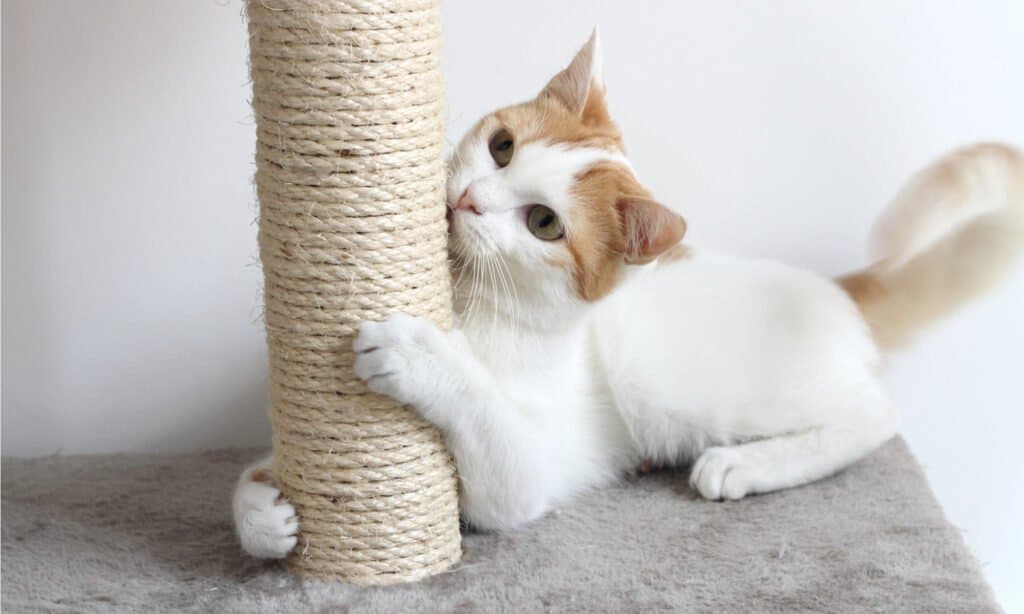
Make sure all of your cat’s needs are cared for and they can exhibit natural behaviors like scratching.
©rossella/Shutterstock.com
Cat toys and scratchers don’t have to be expensive, but it’s best to have a wide variety to prevent boredom.
Try making DIY cat toys, such as an old sock stuffed with catnip or a toilet paper roll they can bat around! My cats love scratching flattened shipping boxes as well, especially if I sprinkle them with catnip.
Visit the Veterinarian
If you can’t find an obvious cause for your cat’s meowing, and especially if it’s abnormal for them, it’s important to schedule a vet appointment.
Cats will often do annoying things, like meowing at night, to tell us something’s wrong. They may be in pain or have a medical condition you don’t know about.
If you think a diagnosed medical condition is the reason for your cat’s meowing, you can also schedule an appointment to discuss changing their treatment plan–it’s possible their condition is worsening or the treatment is no longer helping.
Spay or Neuter Your Cat
Spaying or neutering your cat can help if your cat is meowing because they’re in heat, mating, or fighting with other cats.
The surgery also comes with a host of other behavioral and health benefits, including a reduced risk of reproductive cancers.
Keep the Curtains Drawn
Drawing the curtains or blinds can stop your cat from watching outside, where they see neighborhood cats or other frightening things.
Play White Noise or Other Sounds
White noise, television, or music can help both you and your cat.
If you’re trying to tune out your cat’s meowing, you won’t hear it as clearly. And if your cat is afraid of a noise they’re hearing, it can stop them from meowing entirely. Either way, hopefully, this tip can help you get some sleep!
Change Where Your Cat Sleeps
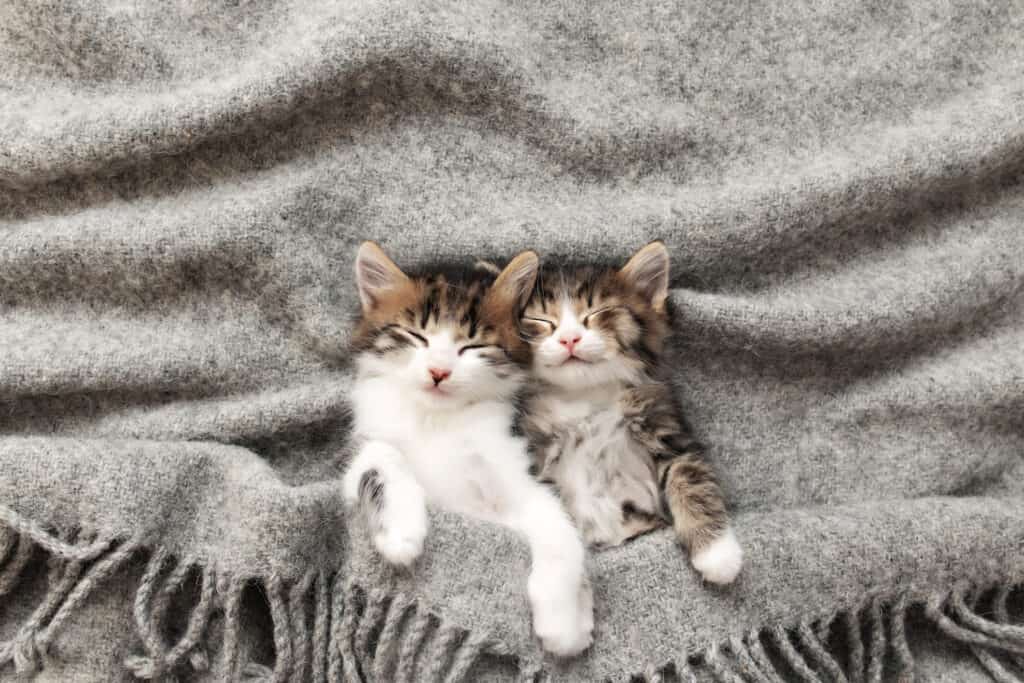
Sometimes, our cat’s bedtime routines aren’t working and need to be changed.
©iStock.com/Olena Ivanova
If your cat is afraid of something outside, keeping them in a room on the other end of the house can help. Or, maybe they really want to sleep in your room with you.
On the other hand, maybe you need to keep your cat out of the bedroom at night because they’re too noisy when they play with their toys, or they’re throwing a tantrum over their new diet.
Use Nightlights to Help Cats with Dementia
Nightlights can help cats with dementia navigate their environment, especially at night. They might need more light to see since they’re no longer relying on memory to find their bed or their litterbox.
Keeping furniture and your cat’s items in the same place can also help your cat with dementia, as it helps with routine and reduces confusion.
Separate Fighting Cats
If your cats are fighting (and not playfully!), they’ll need to be separated. Keeping them together will only add to the animosity and fear they feel and worsen their relationship.
Some people believe cats can work out disputes on their own, but this isn’t true if they’re fighting in an aggressive manner. They may injure or even kill one another if left to their own devices.
Keep them in separate rooms for now and reintroduce them slowly and properly. This will also help you get to sleep!
Sometimes, You Need to Wait Them Out
As we discussed above, you shouldn’t try to let your cat “cry it out” if you’re unsure what the problem is. But if you know and cannot accommodate them, you may need to wait until they get used to their new routine.
White noise, earplugs, and keeping them out of the bedroom can all help you get a restful sleep despite the meowing.
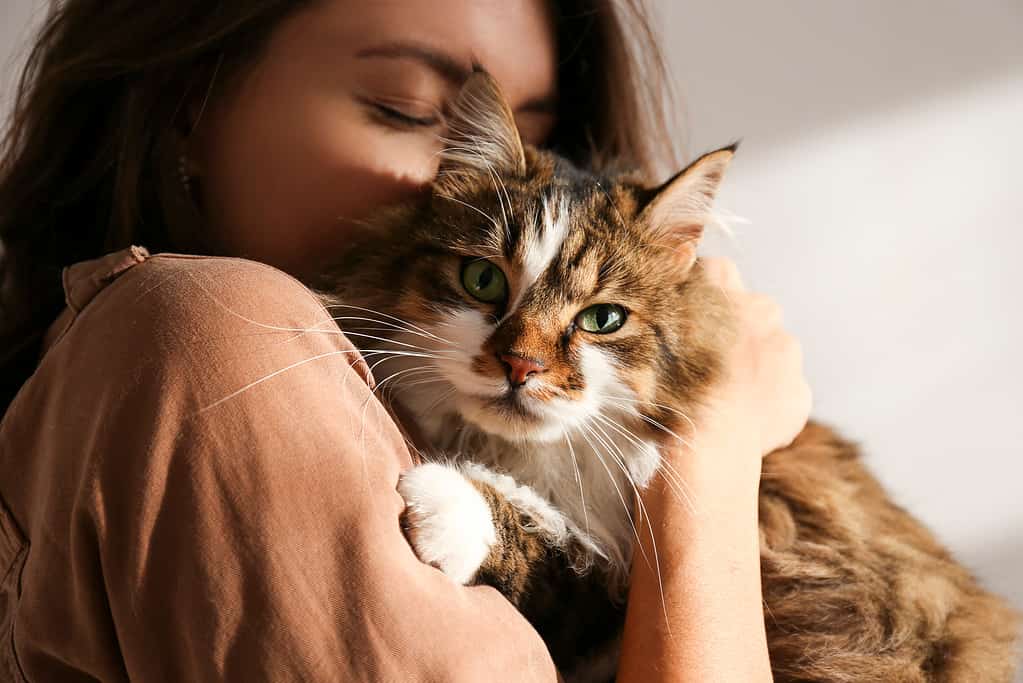
It’s important to figure out why your cat is meowing at night, as it’s the first step to finding a solution.
©evrymmnt/Shutterstock.com
Summary of 18 Reasons Why Cats Meow at Night
| Number | Reason | Solution |
|---|---|---|
| 1 | Boredom | More daily play and attention |
| 2 | Loneliness | More attention during the day, treat separation anxiety if present |
| 3 | Lack of Exercise | Schedule two to three 10-15 minute play sessions daily |
| 4 | They Want Outside | Wait out the behavior using earplugs or white noise if needed |
| 5 | Begging for Food | Schedule mealtimes and wait out behavior if necessary |
| 6 | Playing | Keep cats out of the bedroom and use earplugs or white noise to help with the sound |
| 7 | Feline Dementia | See your veterinarian |
| 8 | Hyperthyroidism | See your veterinarian |
| 9 | Kidney Disease | See your veterinarian |
| 10 | Pain | See your veterinarian |
| 11 | Mating | Spay or neuter cats |
| 12 | In Heat | Spay your cat |
| 13 | Fighting | Spay or neuter cats, separate and reintroduce |
| 14 | Fear of Other Cats | Close blinds or curtains, play white noise and keep them in quiet, secluded areas of the home |
| 15 | Dreaming | Enjoy watching them sleep, and try not to wake them! |
| 16 | Dirty Litterbox | Scoop the litterbox before bed and ensure there are enough litterboxes in the home |
| 17 | Fear | Close blinds or curtains, play white noise, and keep them in quiet, secluded areas of the home |
| 18 | They Want in the Bedroom | Let them inside, create a comfy sleeping space outside of the bedroom, block off the bedroom door to prevent scratching, and wait them out if needed |
Thank you for reading! If you have feedback on this post, please contact the AZ Animals editorial team.
The photo featured at the top of this post is © A-Z-Animals.com/
Thank you for reading! Have some feedback for us? Contact the AZ Animals editorial team.







